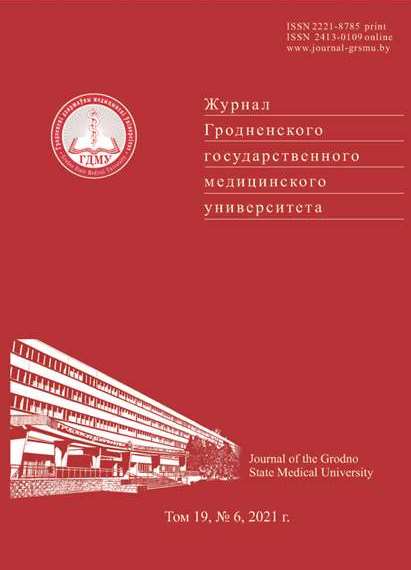ОСОБЕННОСТИ ЭКСПРЕССИИ РЕЦЕПТОРОВ ЭСТРОГЕНОВ, ПРОГЕСТЕРОНА И АНДРОГЕНОВ ПРИ НАСЛЕДСТВЕННЫХ И СПОРАДИЧЕСКИХ ОВАРИАЛЬНЫХ КАРЦИНОМАХ
Аннотация
Введение. Овариальные карциномы – сложное гетерогенное заболевание с разнообразием клинико-морфологических форм. В большинстве случаев опухоли яичников экспрессируют эстрогеновые (РЭ), прогестероновые (РП) или андрогеновые (РА) рецепторы, но, в отличие от рака молочной железы, эти данные в настоящее время не используются в клинической практике.
Цель исследования. Определить прогностическое значение морфологических и некоторых иммуногистохимических маркеров при овариальной карциноме и установить неблагоприятные варианты, которые требуют индивидуализации лечения.
Материал и методы. С использованием иммуногистохимических методов проведена оценка экспрессии рецепторов к эстрогенам, прогестерону, андрогенам в образцах овариальной карциномы 79 пациенток. Нами изучена связь рецепторного статуса опухоли с выживаемостью, стадией заболевания, степенью дифференцировки опухоли, BRCA1 статусом, возрастом пациенток, типом лечения, предполагая, что уровень экспрес- сии рецепторов и прогноз заболевания будет иметь различия в подгруппах.
Результаты. Экспрессия рецепторов и ее прогностическое значение оценивались по отдельности для каждого иммуногистохимического маркера. РЭ-положительными были 32 опухоли (40,5%), РП-положительными – 13 (16,5%) и РА-положительными – 29 (40%). Кривые выживания для всех пациенток с разной экспрессией рецепторов гормонов в опухоли были идентичными и при сравнении демонстрировали медиану выживаемости без прогрессирования (ВБП) 19 месяцев и медиану общей выживаемости (ОВ) 37 месяцев. Улучшение прогноза имело место у пациенток с РА-положительными опухолями. Позитивное влияние на прогноз имело место при отсутствии в опухоли экспрессии РЭ. Медианы ВБП и ОВ при РЭ-негативном статусе опухоли в этих группах выше более чем на 6 месяцев.
Выводы. Анализ морфологических, клинических и иммуногистохимических данных и их влияние на прогноз показали схожие результаты во всех подгруппах. Улучшение прогноза имело место у пациенток с РЭ-негативными и РА-положительными опухолями. Таком образом, в нашем исследовании установлено влияние экспрессии РЭ и РА в овариальной карциноме на прогноз для жизни. Определение рецепторного статуса опухоли яичников позволит стратифицировать пациенток на группы по данному признаку и в будущем продолжить исследования по изучению эффективности гормональной терапии овариальной карциномы.
Литература
Siegel RL, Miller KD, Jemal A. Cancer Statistics, 2017. CA Cancer J Clin. 2017;67(1):7-30. https://doi.org/10.3322/caac.21387
Abelev GI, Altshtejn AD, Belickij GA Bershtejn LM, Vasilev JuM; Zaridze DG, editor. Kancerogenez. Moskva: Medicina; 2004. 574 p. (Russian).
Luo H, Li S, Zhao M, Sheng B, Zhu H, Zhu X. Prognostic value of progesterone receptor expression in ovarian cancer: a meta-analysis. Oncotarget. 2017;8(22):36845-36856. https://doi.org/10.18632/oncotarget.15982
Modugno F, Laskey R, Smith AL, Andersen CL, Haluska P, Oesterreich S. Hormone response in ovarian can- cer: time to reconsider as a clinical target? Endocr Relat Cancer. 2012;19(6):255-279. https://doi.org/10.1530/ERC-12-0175
Sieh W, Köbel M, Longacre TA, Bowtell DD, deFazio A, Goodman MT, Høgdall E, Deen S, Wentzensen N, Moysich KB, Brenton JD, Clarke BA, Menon U, Gilks CB, Kim A, Madore J, Fereday S, George J, Galletta L, Lurie G, Wilkens LR, Carney ME, Thompson PJ, Matsuno RK, Kjær SK, Jensen A, Høgdall C, et al. Hormone-receptor expression and ovarian cancer survival: an Ovarian Tumor Tissue Analysis consortium study. Lancet Oncol. 2013;14(9):853-62. https://doi.org/10.1016/S1470-2045(13)70253-5
Andersen CL, Sikora MJ, Boisen MM, Ma T, Christie A, Tseng G, Park Y, Luthra S, Chandran U, Haluska P, Mantia-Smaldone GM, Odunsi K, McLean K, Lee AV, Elishaev E, Edwards RP, Oesterreich S. Active Estrogen Receptor-alpha Signaling in Ovarian Cancer Models and Clinical Specimens. Clin Cancer Res. 2017;23(14):3802- 3812. https://doi.org/10.1158/1078-0432.CCR-16-1501
Bogush TA, Basharina AA, Bogush EA, Tyulyandina AS, Tyulyandin SA, Davydov MM. Kojekspressija jestrog- enovyh receptorov alfa i beta v tkani seroznogo raka jaich- nikov [Coexpression of estrogen receptors alpha and beta in serous ovarian cancer]. Rossijskij bioterapevticheskij zhurnal [Russian Journal of Biotherapy]. 2017;16(4):34- 37. https://doi.org/10.17650/1726-9784-2017-16-4-34-37 (Russian).
Green S, Walter P, Greene G, Krust A, Goffin C, Jensen E, Scrace G, Waterfield M, Chambon P. Cloning of the human oestrogen receptor cDNA. J Steroid Biochem. 1986;24(1):77-83. https://doi.org/10.1016/0022-4731(86)90035-X
Chan KKL, Siu MKY, Jiang YX, Wang JJ, Wang Y, Leung THY, Liu SS, Cheung ANY, Ngan HYS. Differential ex- pression of estrogen receptor subtypes and variants in ovarian cancer: effects on cell invasion, proliferation and prognosis. BMC Cancer. 2017;17(1):606. https://doi.org/10.1186/s12885-017-3601-1
Foulkes WD, Metcalfe K, Sun P, Hanna WM, Lynch HT, Ghadirian P, Tung N, Olopade OI, Weber BL, McLennan J, Olivotto IA, Bégin LR, Narod SA. Estrogen receptor status in BRCA1- and BRCA2-related breast cancer: the influence of age, grade, and histological type. Clin Cancer Res. 2004;10(6):2029-34. https://doi.org/10.1158/1078-0432.CCR-03-1061
Kurman RJ, Carcangiu ML, Herrington CS, Young RH, editors. WHO Classification of Tumours of Female Reproductive Organs. 4th ed. Lyon: IARC; 2014. 309 p.
Shafrir AL, Rice MS, Gupta M, Terry KL, Rosner BA, Tamimi RM, Hecht JL, Tworoger SS. The association between reproductive and hormonal factors and ovarian cancer by estrogen-α and progesterone receptor status. Gynecol Oncol. 2016;143(3):628-635. https://doi.org/10.1016/j.ygyno.2016.09.024
Aghmesheh M, Edwards L, Clarke CL, Byth K, Katzenellenbogen BS, Russell PJ, Friedlander M, Tucker KM, de Fazio A. Expression of steroid hormone receptors in BRCA1-associated ovarian carcinomas. Gynecol Oncol. 2005;97(1):16-25. https://doi.org/10.1016/j.ygyno.2004.12.030
Li H, Liu Y, Wang Y, Zhao X, Qi X. Hormone therapy for ovarian cancer: Emphasis on mechanisms and applica- tions (Review). Oncol Rep. 2021;46(4):223. https://doi.org/10.3892/or.2021.8174
Shen Z, Luo H, Li S, Sheng B, Zhao M, Zhu H, Zhu X. Correlation between estrogen receptor expression and prognosis in epithelial ovarian cancer: a meta-analysis. Oncotarget. 2017;8(37):62400-62413. https://doi.org/10.18632/oncotarget.18253
Lindgren PR, Cajander S, Bäckström T, Gustafsson JA, Mäkelä S, Olofsson JI. Estrogen and progesterone recep- tors in ovarian epithelial tumors. Mol Cell Endocrinol. 2004;221(1-2):97-104. https://doi.org/10.1016/j.mce.2004.02.020
Novichkov EV, Votintsev AA. Zavisimost prognoza raka jaichnikov ot jekspressii receptorov k polovym gormonam i proliferativnoj aktivnosti opuholevyh kletok [Ovarian can- cer prognosis and expression of receptors to sex hormones and proliferative activity of tumor cells]. Arhiv patologii [Archive of Pathology]. 2006;68(2):10-13. (Russian).
Hornung R, Urs E, Serenella E, Edward W, Ursula S, Urs H, Daniel F. Analysis of potential prognostic factors in 111 patients with ovarian cancer. Cancer Lett. 2004;206(1):97-106. https://doi.org/10.1016/j.canlet.2003.10.034
Lee P, Rosen DG, Zhu C, Silva EG, Liu J. Expression of progesterone receptor is a favorable prognostic marker in ovarian cancer. Gynecol Oncol. 2005;96(3):671-677. https://doi.org/10.1016/j.ygyno.2004.11.010
Park SH, Cheung LW, Wong AS, Leung PC. Estrogen reg- ulates Snail and Slug in the down-regulation of E-cadherin and induces metastatic potential of ovarian cancer cells through estrogen receptor alpha. Mol Endocrinol. 2008;22(9):2085-2098. https://doi.org/10.1210/me.2007-0512
de Toledo MC, Sarian LO, Sallum LF, Andrade LL, Vassallo J, de Paiva Silva GR, Pinto GA, Soares FA, Fonseca CD, Derchain SF. Analysis of the contribution of immunologically-detectable HER2, steroid receptors and of the "triple-negative" tumor status to disease-free and overall survival of women with epithelial ovarian cancer. Acta Histochem. 2014;116(3):440-447. https://doi.org/10.1016/j.acthis.2013.09.010
Elattar A, Warburton KG, Mukhopadhyay A, Freer RM, Shaheen F, Cross P, Plummer ER, Robson CN, Edmondson RJ. Androgen receptor expression is a biological marker for androgen sensitivity in high grade serous epithelial ovarian cancer. Gynecol Oncol. 2012;124(1):142-7. https://doi.org/10.1016/j.ygyno.2011.09.004
Jönsson JM, Arildsen NS, Malander S, Måsbäck A, Hartman L, Nilbert M, Hedenfalk I. Sex Steroid Hormone Receptor Expression Affects Ovarian Cancer Survival. Transl Oncol. 2015;8(5):424-433. https://doi.org/10.1016/j.tranon.2015.09.002
Wang C, Bai F, Zhang LH, Scott A, Li E, Pei XH. Estrogen promotes estrogen receptor negative BRCA1-deficient tumor initiation and progression. Breast Cancer Res. 2018;20(1):74. https://doi.org/10.1186/s13058-018-0996-9
George A, McLachlan J, Tunariu N, Della Pepa C, Migali C, Gore M, Kaye S, Banerjee S. The role of hormonal therapy in patients with relapsed high-grade ovarian car- cinoma: a retrospective series of tamoxifen and letrozole. BMC Cancer. 2017;17(1):456. https://doi.org/10.1186/s12885-017-3440-0































